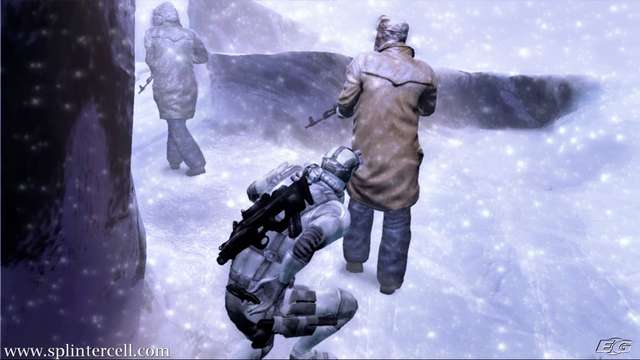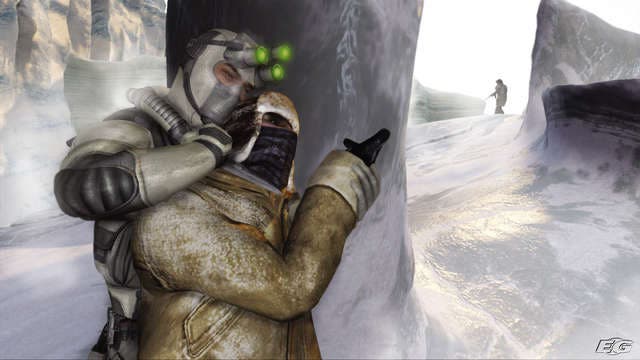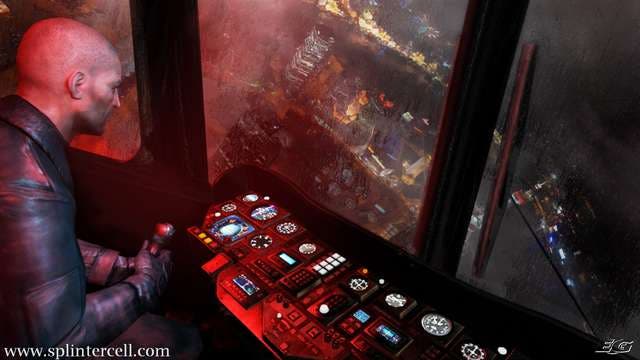Splinter Cell: Double Agent
A question of trust?
Policy of truth
The rest of the game does its usual tour of duty around the globe, taking in some excellent - and varied - missions in China, West Africa and Iceland among others, which all offer up hugely contrasting scenarios that the series die-hards will love - and if you've never played a Splinter Cell game before, you'll be downright astounded by the cinematic visual opulence on show - particularly the panoramic view over Shanghai and the Chinese New Year celebrations. It's ambitious stuff, and made all the more glorious by some of the most incredible character models yet seen in a game. Once again, Ubisoft delivers some delicious eye candy that - in high def - is wonderful to behold from start to thrilling finish.
But back on topic, these globe-trotting excursions provide important refreshment value between the punishing HQ levels, whilst each offering something unique to each and every one, and it's perhaps the acknowledgement of the consistent high quality throughout the game that's going to leave players with the same feel-good factor that I'm left with after completing it. Taking its cue from high-budget blockbuster movies, the fact that Ubisoft has packed in so many movie-esque moments while staying true to the stealth premise is a remarkable achievement. But as much as the game wows you with its ability to make you play like a spy without making it boring, don't for one moment think that Double Agent doesn't let you loose off a few rounds in anger. In fact, on the penultimate level you can put the trusty SC-20k rifle to good use without getting a slapped wrist for it. You can, of course, still play much of the game with the pistol or rifle if you want, but not only will you make it a lot harder for yourself (mainly by attracting attention more than anything), you'll risk losing more respect than you can afford - not to mention failing various conditions of your mission.

So, with the single-player refinements so apparent, it's no surprise to find that Ubisoft has really listened to the criticisms of the rather detached narrative that used to make previous versions feel like a disjointed collection of unrelated episodes. Having played all three previous adventures to completion, none of them had particularly memorable scenarios or characters, but Double Agent is a major improvement. By taking elements of The Chronicles of Riddick, your ability to wander around the confines of the JBA HQ (in first-person if you like) and repeatedly meet the various key players in the game makes a big difference when it comes to the between-mission briefings. You feel a connection with people, and given that you're playing a key part in the terrorists' activities, you know some of their motivations too. With Colonel 'the former president in 24' Lambert popping up from time to time, there's even more of a '24'-style feel to it. In fact, it's a shame Ubisoft didn't do the 24 videogame, come to think of it. It'd probably feel a bit like this.
A question of time
One absolutely mystifying downside of Double Agent is how long it takes to save and load your game. Given how fundamental saving is to the game, it's an absolute joke that it takes well over a minute between hitting 'save' and the completion of the process. And loading is a complete bore too - unless you choose to opt for the most recent save point or checkpoint (which takes seven seconds, to be precise). If you dare to want to load a different save point, it's just as tedious as the save process, and in the trickier sections of the game it's almost unforgivable. Wasn't next-gen gaming supposed to make things like this quicker? Goodness knows how much time was wasted faffing around with the save and load nonsense, but Ubi needs to make sure it never happens again.

But before we round off the review, who could forget the absolutely superb multiplayer element? Like a more action-focused evolution of the Chaos Theory's Spies Vs Upsilon Mercenaries face-offs that proved so popular, it's been ramped up in terms of pace and numbers. With far more athletic spies than before, the change of pace is bound to cause a massive amount of controversy with the existing fan base who prefer the tension of old, but it's a decision that will definitely attract a lot more players as a result.
As before, you're either the nimble gadget-laden ones doing the hacking, or the slightly lumbering gun-toting team trying to stop the meddling intruders from stealing the valuable data. Just as before, the spies play in third-person and have access to various sections of the map that the Mercs don't (such as ventilation shafts), but what the Mercs lack in agility they make up for with their high powered automatic weaponry, and you end up with one of the most finely balanced multiplayer games around.
Waiting for the night
It definitely takes a fair bit of getting used to in order to adjust to the super-speedy spies, but it's a good decision. The controls, especially on the spies, feel incredibly slick, giving you the chance to leap and roll around the maps with improbable grace. For newcomers, you even get the choice of whether to include ghost outlines next to contextual actions (such as which bits of the environment you can jump onto), and as such it feels a lot more accessible than previously. How it will fare over the long term is hard to say, but the early impressions are excellent. Lag, for example, was non-existent throughout our playtest, unlike several other Live games we've encountered of late.

And elsewhere, Ubi has polished the online offering enormously, with a stat-based online level-up system that encourages repeat play on both sides. You can even recruit players to join your own clan to take on all comers, which should prove enormously popular. The various co-op challenges should go down well, too, offering the chance to take on the AI to earn medals and build up your stats. Of course, in the main multiplayer matches for those who just want to dip in, the ranked matches and player matches are kept distinct, so its appeal should be pretty broad, and Double Agent could be dragging away GRAW and Halo 2's players very soon.
Unlike previous games in the series, scoring Splinter Cell Double Agent isn't a difficult task. On the basis of the solo mode alone it's worth a nine, not just because it's by far the best game in series to date, but because it's finally delivering on the rich potential that's been apparent since the beginning. By giving players a real incentive to be the stealthy super-spy, it's opening the game up to being what it should have been. And by wrapping it in a memorable narrative and giving Sam Fisher the ability to be evil, you actually start to care not only about your actions, but the characters in the game too. Throw in a hugely entertaining and evolving multiplayer component, and it's got the makings of a game you'll be playing for months to come.
It's not so much a question of trust anymore, but question of whether you trust stealth gaming to entertain you. If you're not sure, then maybe this is the place to start.

